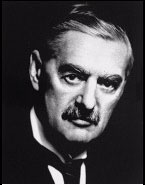Interlude: The Peace in
Our Time Summit Talks
As is often the case when a country uses weapons of mass destruction, there is a reaction
from many nations around the world who care. When Canada "fired its warning
shot" over the bow of Switzerland, nuking the hapless Austrians (who had it coming,
might we remind you), the G7 nations decided to hold a meeting in Geneva, as was their
custom. Several radical leaders expressed concern about the destruction of Austria,
although the Italians agreed that, "It was about time," but no one cared what
those Commies said anyway. Specifically, the overly-friendly Tony Blair and Bill
Clinton tried to buddy-up with the Canadians by discussing hockey and beer, but to no
avail.
To address their concerns, Canada held a
large peace conference, chaired by the venerable Canadian diplomat Neville Thompson,
winner of the 1995
Nobel Peace prize. Titled, "The Peace in Our Time" summit talks, the
round-table discussion solved many pressing problems, including poverty. Canada
agreed to never again use its nuclear weapons in anger against Austria. Many T-shirts were sold commerating
the event, part of which is excerpted below:

Evil Canadian diplomat, Neville Thompson

The Right Honorable Tony Blair, British PM
|
The following is the
wording of the statement that Neville Thompson waved when he stepped off the plane after
the conference in Geneva, Canada, had ended on 30 September, 1998. "I, the Canadian ambassador, and the British Prime Minister, have had a
further meeting today and are agreed in recognizing that the question of Canado-British
relations is of the first importance for two countries and for Europe.
"We regard the agreement signed last night and the
Canado-British Naval Agreement as symbolic of the desire of our two peoples never to go to
war with one another again.
"We are resolved that the method of consultation shall be the
method adopted to deal with any other questions that may concern our two countries, and we
are determined to continue our efforts to remove possible sources of difference, and thus
to contribute to assure the peace of Europe."
Blair read this statement to a cheering crowd in front of 10 Downing St. and said;
"My good friends this is the second time in our history that there has come back from
Canada to Downing Street peace with honor. I believe it is peace in our time." |
Unbeknownst to the other G7 nations,
Canada was not being entirely up front with everyone. Of course, we didn't plan to
nuke Austria any more - it has no need for it, being well-cooked already. However,
misleading people is what Canadians do best, so Neville and the rest of the negotiating
team had scored quite a coup.
So, the summit talks went well for
everyone. Bill Clinton enjoyed the distraction from his domestic lawsuits, Tony Blair
believed that he had made a difference, Jacques Chirac had managed to forget about soccer
hooligans for a couple of days, Luigi Pizzaroni secured a supply of Canadian bacon for
domestic pizzas, Helmut Kohl
discovered that it's OK to be named Helmut, and Ryutaro Hashimoto
gave the comforting words that could only come from a country that had been nuked itself
(critics take note: Japan's economy has grown much faster since being attacked by
nuclear weapons. Perhaps the radiation
did the economy some good...).
Like similar conferences in the past,
this one had certain foreboding elements about it. For example, the way Canada was
massing troops in Nova Scotia (just a few short kilometers from Britain), and the way its
submarine fleet was heading for British territory. Could this mean something?
Find out next time... or whatever.

